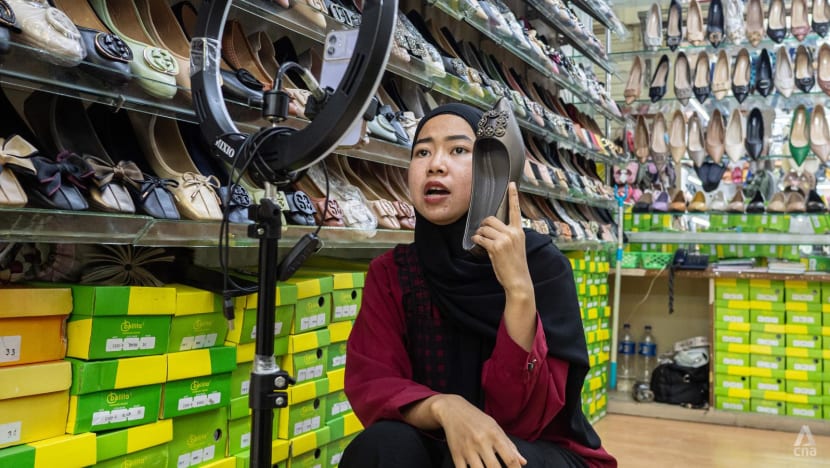No more TikTok buys: Indonesian shoppers fret over higher prices as analyst says ban a ‘partial step’ to aid local firms
Indonesia is the first Southeast Asian country to implement regulations prohibiting social media companies from simultaneously operating as e-commerce platforms, said analyst Dedi Dinarto.

File photo showing a shopkeeper showcasing a product from her shoe store in Jakarta, Indonesia during a livestream on TikTok. (Photo: CNA/Wisnu Agung Prasetyo)
SINGAPORE: For the past two months, factory worker Subairi has come to rely on TikTok Shop to purchase his daily necessities. From baby formula to cooking oil, he stocks up on these items each payday.
But with the announcement that the Indonesian government has banned the direct sales of goods on social media platforms, Mr Subairi - who like many Indonesians go by one name - is worried over the loss of a cheaper shopping alternative.
“If TikTok Shop is banned, I will find it difficult to find items that are as cheap as (those sold there),” the 38-year-old from Karawang, West Java told CNA.
“On other e-commerce platforms, the service fee is almost 10,000 rupiah (US$0.64) but on TikTok Shop it is totally free, with no conditions.”
Mr Subairi added that the flash sales and payday promotions - normally offered at the end of the month when workers receive their salaries - on TikTok Shop make the prices much cheaper. He has been comparing prices of goods across various e-commerce platforms, and found those sold on TikTok Shop to be the cheapest.
“Yesterday, I bought baby formula. Elsewhere, the cheapest price was 320,000 rupiah but on TikTok, with various discounts, I could get (the formula at) around 300,000 rupiah,” said the father of two.
Meanwhile, TikTok Shop buyer Nadya Aulia Arma told CNA that while she disagrees with the new regulation, she will accept the development and switch to using other e-commerce platforms.
“I honestly don't agree, because I will lose a place to buy things at low prices. But if it's for the good of the Indonesian people, that's okay. I'll go back to shopping on Shopee,” she said.
BAN TAKES EFFECT IMMEDIATELY
On Monday (Sep 25), the Indonesian government announced that it will no longer allow social media platforms to double as e-commerce sites, in order to prevent the misuse of data.
"(Social media) can only (be used to) facilitate the promotion of goods or services (but) direct transactions … (and) direct payments are no longer allowed; (social media) can only be used for promotion," said Trade Minister Zulkifli Hasan after a closed meeting on electronic commerce issues.
Under the Revised Ministry of Trade Regulation, a minimum import transaction of US$100 will also be imposed on goods purchased from abroad.
While the ban has caught the disappointment of buyers, some sellers at physical stores in Indonesia have celebrated the move.
Textile seller Iyal Suryadi told CNA that the sale of goods online has reduced his income.
“In the local market where we sell our goods, sometimes we only sell one or two pieces of cloth in a week … If it continues like this, don’t even think about growing (the business); just being able to survive is good,” he said.
He added that the prices of items sold on TikTok Shop “do not make sense”.
“They sell goods at factory prices directly to consumers, not to distributors or resellers. It is true that we have entered the free market, but let's not go too far.
“The government must act if it does not want the country's economy to be destroyed. The reason is that the money in this country revolves around the small people like us, not the rich,” said Mr Suryadi, who owns a shop at Pasar Cipeundeuy located in Subang, West Java.
Similarly, Mr Raden, a seller at Tanah Abang market in Jakarta, agreed that TikTok Shop has hurt his sales due to the cheap prices offered on the social media platform.
However, he told CNA that he disagrees with the new ban and suggested that the sale of items through social media be restricted instead.
“(This is) because there are merchants here who also sell through TikTok. They are forced to sell on TikTok because the physical market is starting to be abandoned by buyers,” said Mr Raden, who goes by one name.
“In my opinion, TikTok shops should not be banned but restricted. (Instead), foreign products should be stopped and domestic products should be sold.”
In response to the ban, TikTok Indonesia said that it will abide by the laws and regulations of the country.
"However, we also hope that the government will consider the effect (of the ban) toward the livelihood of six million local sellers and around seven million creator affiliates that use TikTok Shop," a TikTok Indonesia spokesperson was quoted as saying by Tempo on Tuesday.
The platform, owned by China's ByteDance, reportedly said that it has received complaints from local sellers and has asked for certainty from the authorities regarding the newly issued regulation.
According to Tempo, TikTok said that social commerce emerged as a solution to the problems faced by micro, small and medium enterprises (MSMEs), adding that it believes that TikTok Shop was established to support local sellers to collaborate with local creators in order to boost traffic for their online shops.
TikTok has been hit with allegations that its TikTok Shop service is implementing predatory pricing by selling imported goods at significantly lower prices, thus leading to major profit losses for MSMEs who struggle to compete with such prices.
Related:
BANNING SOCIAL COMMERCE A SMALL STEP TO HELPING LOCAL BUSINESSES: ANALYST
Mr Dedi Dinarto, lead Indonesia analyst at public policy advisory firm Global Counsel, told CNA that Indonesia is the first Southeast Asian country to implement regulations prohibiting social media companies from simultaneously operating as e-commerce platforms.
“TikTok is expected to be the most affected, as TikTok Shop currently allows Indonesian buyers to make direct purchases within the app, whereas platforms like Facebook, Instagram, and WhatsApp lack built-in transaction features,” he said.
However, he noted that small vendors who have benefited from TikTok Shop can still use any social media platforms to advertise their products, even though transactions will now need to be arranged separately between buyers and sellers.
“Engaging in transactions outside of the apps may be considered risky, and this will place established e-commerce platforms such as Shopee, Lazada, and Tokopedia as more trusted options for online purchases,” said Mr Dinarto.
Meanwhile, speaking to CNA, Jakarta-based economist Bhima Yudhistira from the Center of Economic and Law Studies (CELIOS) said that banning social commerce is just a partial step to help SMEs.
“The government also needs to monitor illegal imports through airplane passengers - such as through a service known as Jastip - and also support SMEs by lowering lending rates, increasing domestic purchasing power, and government procurement absorption of SME products,” said Mr Yudhistira.
Jastip allows buyers to obtain items available overseas by contracting the services of travellers who can buy and deliver the goods in their travels.
On Jun 15, TikTok announced that it would invest billions of dollars in Southeast Asia over the next few years.
A TikTok spokesperson told CNA then that US$12.2 million will be aimed at helping more than 120,000 small- and medium-sized businesses transition online.
"This will consist of cash grants, digital skills training, and advertising credits for SMBs, including micro businesses, in rural and suburban areas, and comes as the platform continues to grow into a valuable platform for businesses and creators,” the firm said.
Commenting on this, Mr Yudhistira said that Tiktok’s investment commitments were not clear enough.
“Is the cash grant for SMEs part of the discount that the platform offers to big producers selling directly to consumers?
“I think the investment commitment will be part of TikTok’s bargaining power to ensure that the government does not ban the Tiktok Shop. However, it seems the Tiktok approach didn't work well,” he told CNA.
Pointing out the challenges that may be faced in implementing the ban, Dr Siwage Dharma Negara, a senior fellow at ISEAS - Yusof Ishak Institute, said: “(The enforcement of the ban) requires good coordination with enforcement agencies, and coordination is always challenging in Indonesia.
“Yet, people have become used to social media commerce especially since the COVID-19 pandemic and going against the trend will not be easy.”
He added that the government must consider the views of all stakeholders on the right regulation for e-commerce in Indonesia.
“Regulations are important to give legal certainty for doing business, but at the same time they cannot be too rigid and constraining innovation in the digital technology application,” commented Dr Siwage.
TikTok has 8,000 employees in Southeast Asia, and two million small vendors selling their wares on its platform in Indonesia, the region's biggest economy, according to TikTok chief executive officer Shou Zi Chew.
E-commerce transactions across the region reached nearly US$100 billion last year, with Indonesia accounting for US$52 billion, according to data from consultancy Momentum Works.



















